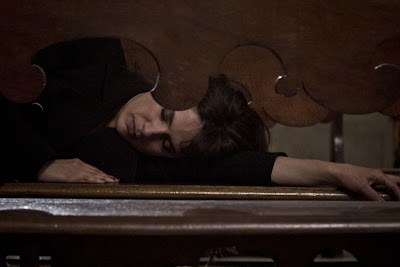All of which makes Marco Bellochio's newest film DORMANT BEAUTY (Sleeping Beauty is a closer translation, but I guess that one's been used a few too many times) such a strong and satisfy-ing film. A surprising one, too -- and not in terms of what Signore Bellocchio (shown above) is capable of and usually gives us. Rather, the surprise comes from the fact that this writer/director does not take a side but instead shows us several sides. (Yes, in life, there exists more than merely "pro" and "con.") This forces us to confront human beings in specific situations, rather than mere ideas.
The film takes place in 2009, during the fraught period just prior to an Italian father's pulling the plug on his daughter, Eulana Englaro, who had been in a coma for some 17 years. (For an American version of this, think back to 2005 and the case of Terri Schiavo.) While Italians demonstrate on both sides, Bellocchio zeroes in on a handful of disparate people.
Among these are a Senator (Toni Servillo, above left) whose personal feelings and conscience go against those of his party, and, in fact, of his own daughter (Alba Rohrwacher, below, right) who is adamantly pro-life. His conversations with his peers, as well as with a "therapist to the politicians," are among the film's most trenchant and sometime darkly amusing. When she becomes suddenly involved in an incident provoked by the other side, her life takes a drastic change, as she finds herself drawn to the brother of one of the protesters (Michele Riondino, below, left). This situation -- fodder, it might seem, for a smart rom-com -- is here used in a way that allows these characters, along with us, to try for some growth and change.
The dormant beauty of the title, in addition to the real Eulana, is found in the home of a famous French/Italian actress, played by Isabelle Huppert, below. Her daughter, too, is comatose, and while the father and brother might like to see that plug pulled, the actress, who has renounced theater, has submerged herself in the Catholic faith. That this section, though believable enough, is the least persuasive should not be surprising, for all-or-nothing religious faith must, I think, be experienced to be truly understood.
Elsewhere, a drug-addicted woman (Maya Sansa, below, left) is taken notice of by a doctor (the filmmaker's younger brother, Pier Giorgio Bellocchio, below, right) and a dance of death/life ensues, and again, thanks to first-rate writing, directing and performing, we're able to understand things from both sides of the war. Will the movie change any viewer's viewpoint from one side to the other? Probably not. But it probably will make the "other" a little more understandable.
That this really excellent film does not yet have U.S. distribution (most of Bellocchio's film have found such) is more than a shame. Perhaps in the days to come some savvy/enterprising distributor will step up to the plate. Meanwhile, Dormant Beauty plays at Film Comment Selects for three showings (more than any other film in the series, except for Nights With Theodore, which also plays thrice): Wednesday, February 20, at 6:30 pm; Friday, February 22, at 4:00 pm; and Sunday, February 24, at 5:15 pm.
See the entire Film Comment Selects schedule here.












No comments:
Post a Comment